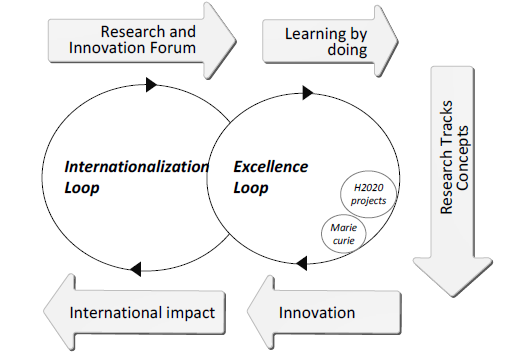The overall concept idea of LINK is shown in the figure below.
In order to implement LINK a double loop strategy will be applied:
The excellence loop: this loop will create the ecosystem for sustainable linking and synergies exploitation inside the consortium in order to increase excellence and widening EU participation.
- Cutting edge research tracks: Using a structured assessment of the PHC research status and an international research forum, a roadmap for excellence in biomedical knowledge and intelligent algorithms for CVD management shall be established. From this research agenda, specific cutting edge research tracks shall be selected based on the consortium competences and potential scientific, technical and industrial impacts, and developed by common interinstitutional workgroups. The starting point for these analysis are known gaps in intelligent processing for PHC that will be extended using the research agenda.
- Knowledge transfer and promotion of synergies: Inter-institution research teams coordinated by a research track chair shall be defined for each defined research track. Workshops, training programs, researcher exchange and internships will support the setup and knowledge transfer between partners required to kick-off each research track. Implementation of these research activities shall be pursued using available resources inside the consortium (e.g., on-going or new projects) as well as financial resources to be obtained from common proposals. These will foster knowledge transfer between partners by using a “learn by doing” approach, supported by resource sharing (e.g., data, toolboxes, specialised equipment, networks, etc.), team building activities, advanced training programs (e.g., seminars and webinar, teacher exchange for PhD courses/modules, etc.), by researcher exchange, internships and co-supervision activities (e.g., PhDs), but also consolidate and increase excellence of the consortium in these areas.
- Shared advanced training: Existing national and European grant programs (e.g., Marie Skłodowska-Curie grants, FCT grant programs such as the MIT-Portugal program or the CMU-Portugal program) as well as transnational twinning protocols (anchored on existing cooperation of the consortium with South American universities and existing governmental grant programs like the Brazilian Ciência sem Fronteiras program) shall be explored in order to recruit and support common PhD and post-doc students. Specific research questions to be developed inside PhD
student training or post-doc training will be identified. At least two complementary coadvisors from different institutions shall team-up for each PhD or Post-Doc. This team shall actively explore PhD and Post-doc grant funding opportunities. - Concept development and H2020 project proposals: Research tracks will support Concept definition activities aimed at identifying the scientific, technical, social and economic requirements of relevant project ideas in PHC for CVD management. These concepts will be the basis for new project and network proposals to be led or to be integrated by researchers of the consortium. Implementation of these project concepts will be performed during LINK or during subsequent years. This strategy will allow a continuum in international cooperation on relevant scientific challenges, sustainable increase in critical mass and international impact/excellence
of the consortium.
The Internationalization loop: this loop will support leverage of international impact of team members by strengthening the links of the consortium to key international societies by promoting an active leading role of the consortium’s members inside these organisations and by exploring synergies with these organizations for training, dissemination and scientific steering.
- Research and innovation forum: Key international as well as regional scientific associations (IEEEEMBS¹, the IFMBE², the Brazilian Society of Biomedical Engineering³, and the European Society of Cardiology), academics (RWTH Aachen University-Germany, University of Zagreb-Croatia, IEEE-EMBS International Summer Schools, Science Faculty of the Universidad Autónoma de San Luís de Potosí-Mexico, Biomedical engineering program of the Federal University of Rio de Janeiro-Brazil, and the National University of Mexico), industrial (Philips Research, Medtronics, VTT, Intellicare), policy making and societal (Cardiology Department of the Centro Hospitalar e Universitário de Coimbra, Cardiology Department of the Centro
Hospital de Leiria, Athinoula A. Martinos Center for Biomedical Imaging of the Massachusetts General Hospital) have been contacted and have already accepted to integrate the research and innovation forum of LINK. This forum will help LINK to perform a strategic analysis in order to identify the gaps in intelligent processing for PHC, to identify the relevant internal and external factors for innovation and high quality research in the field, to identify innovation barriers and innovation best practices. The main output of this forum will be a research agenda to support international research in the field, but also to guide the consortium in its research strategy and approach as well as its project proposals. This key forum will also
support the setup of curricula for advanced training in the area. - International impact: Existing and new links to members of the research forum will support the design of curricula and teaching materials for advanced training. Activities to increase the Consortium members’ involvement in chairing major international events (e.g., MEDICON conference and workshops to be hosted inside major conferences like the IEEE-EMBC) in the field as well as to link to well-established and reputed summer schools (IEEE-EMBS Summer School on Biomedical Signal Processing and IEEE-EMBS Summer School on Telehealth)
will be implemented. Active involvement of consortium members in existing
international working groups in the field (e.g., Health Informatics working group of the IFMBE) will be pursued and deepened by fostering active roles in dissemination and education (e.g., curricula definition, workshop and meeting organization, book series publication) as well as standardization activities. A white paper on key learnings for EU participation will be one major output of the project in order to foster a transnational widening culture.
¹ IEEE society in Engineering in Medicine and Biology – http://www.embs.org/
² International Federation for Medical and Biological Engineering – http://ifmbe.org/
³ Brazilian Society of Biomedical Engineering – http://www.sbeb.org.br
